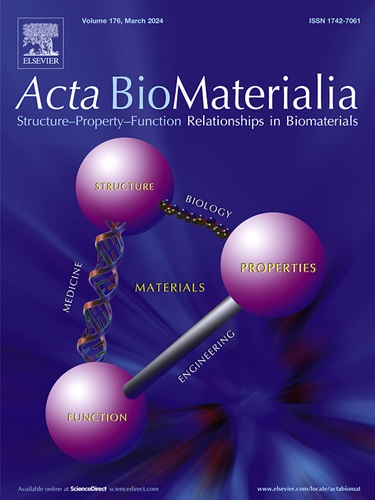口服超小两性离子纳米颗粒克服巨噬细胞调节和结肠炎治疗的粘液和上皮障碍。
IF 9.4
1区 医学
Q1 ENGINEERING, BIOMEDICAL
引用次数: 0
摘要
溃疡性结肠炎(UC)是一种慢性结肠炎症性疾病,由于肠道粘液和上皮屏障,给治疗带来了重大挑战。在本研究中,基于谷胱甘肽(GSH)反应的超支化聚碳酸酯开发了超小两性离子纳米颗粒(HC-CB NPs),以增强药物的口服递送并克服这些生理障碍。HC-CB NPs在广泛的pH环境和生理液体中表现出高度的胶体稳定性,防止药物在胃肠道内过早释放。超小尺寸HC-CB NPs表现出最小的粘蛋白吸附,并有效穿透黏液层,两性离子表面进一步促进通过质子辅助氨基酸转运蛋白1 (PAT1)途径跨越上皮屏障。HC-CB NPs通过单羧酸转运体(mct)途径介导巨噬细胞摄取增强,最终提高结肠炎的治疗效果。体内实验结果显示,装载fk506的HC-CB NPs (HC-CB NPs@FK506)可显著降低炎症标志物(TNF-α、IL-6)和髓过氧化物酶(MPO)水平,同时通过增加E-cadherin表达促进上皮完整性。该研究为克服口腔UC治疗中的肠道障碍提供了一种有希望的方法,提供了生物相容性和临床转化的潜力。重要意义:溃疡性结肠炎(UC)是一种慢性结肠炎症性疾病,由于肠道粘液和上皮屏障,对治疗提出了重大挑战。本研究探讨了使用由gsh反应性超支化聚碳酸酯构建的超小两性离子纳米颗粒(HC-CB NPs)口服UC治疗。与现有的策略相比,HC-CB NPs表现出最小的粘蛋白吸附,并有效地穿透黏液层,两性离子表面进一步促进通过质子辅助氨基酸转运蛋白1 (PAT1)途径穿越上皮屏障。此外,HC-CB NPs通过单羧酸转运体(mct)途径介导巨噬细胞摄取增强,从而提高治疗效果。这些发现强调了HC-CB NPs作为UC治疗中克服肠道屏障的变革性平台的潜力。本文章由计算机程序翻译,如有差异,请以英文原文为准。

Oral delivery of ultra-small zwitterionic nanoparticles to overcome mucus and epithelial barriers for macrophage modulation and colitis therapy
Ulcerative colitis (UC) is a chronic inflammatory disease of the colon that poses significant therapeutic challenges due to the intestinal mucus and epithelial barriers. In this study, ultra-small zwitterionic nanoparticles (HC-CB NPs) is developed based on glutathione (GSH)-responsive hyperbranched polycarbonate to enhance the oral delivery of drugs and overcome these physiological barriers. HC-CB NPs demonstrate high colloidal stability across a wide range of pH environments and physiological fluids, preventing premature drug release within the gastrointestinal tract. The ultra-small sized HC-CB NPs demonstrate minimal mucin adsorption and effectively penetrate through the mucus layer, and the zwitterion surface further facilitate epithelial barrier crossing via the proton-assisted amino acid transporter 1 (PAT1) pathway. HC-CB NPs mediate enhanced macrophage uptake via monocarboxylate transporters (MCTs) pathway and ultimately improved therapy efficacy on colitis. The in vivo results reveal that FK506-loaded HC-CB NPs (HC-CB NPs@FK506) significantly reduce inflammatory markers (TNF-α, IL-6) and myeloperoxidase (MPO) levels, while promoting epithelial integrity by increasing E-cadherin expression. This study offers a promising approach to overcoming intestinal barriers in oral UC treatment, offering biocompatibility and potential for clinical translation.
Statement of significance
Ulcerative colitis (UC) is a chronic inflammatory disease of the colon that poses significant therapeutic challenges due to the intestinal mucus and epithelial barriers. This study explores an oral UC therapy using ultra-small zwitterionic nanoparticles (HC-CB NPs) constructed from GSH-responsive hyperbranched polycarbonate. Compared to existing strategies, HC-CB NPs demonstrate minimal mucin adsorption and effectively penetrate through the mucus layer, and the zwitterion surface further facilitate epithelial barrier crossing via the proton-assisted amino acid transporter 1 (PAT1) pathway. Additionally, HC-CB NPs mediate enhanced macrophage uptake via monocarboxylate transporters (MCTs) pathway, resulting in improved therapeutic efficacy. These findings underscore the potential of HC-CB NPs as a transformative platform for overcoming intestinal barriers in UC treatment.
求助全文
通过发布文献求助,成功后即可免费获取论文全文。
去求助
来源期刊

Acta Biomaterialia
工程技术-材料科学:生物材料
CiteScore
16.80
自引率
3.10%
发文量
776
审稿时长
30 days
期刊介绍:
Acta Biomaterialia is a monthly peer-reviewed scientific journal published by Elsevier. The journal was established in January 2005. The editor-in-chief is W.R. Wagner (University of Pittsburgh). The journal covers research in biomaterials science, including the interrelationship of biomaterial structure and function from macroscale to nanoscale. Topical coverage includes biomedical and biocompatible materials.
 求助内容:
求助内容: 应助结果提醒方式:
应助结果提醒方式:


